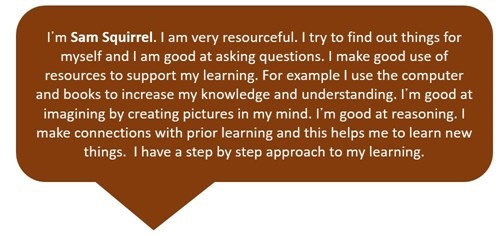Learning Powers
What is Learning Power?
Learning Power refers to a collection of psychological traits and skills that enable a person to engage effectively with a variety of learning challenges. Guy Claxton a cognitive scientist describes it as a form of intelligence possessed by someone who (to quote Piaget) ‘knows what to do when they don't know what to do.’
Guy Claxton research has shown that children who apply their BLP skills to the tasks they undertake can think more deeply, concentrate more effectively and enjoy their lessons more. This results in children making more progress across every aspect of their learning
Within his Building Learning Power (BLP) framework, Guy Claxton proposes that there are 17 learning capacities grouped into four clusters called resilience, resourcefulness, reciprocity and reflection.
- Resilience covers the emotional and attentional aspects of learning, and includes perseverance, absorption (or flow), concentration (or managing distraction) and perceptiveness (or attentive noticing).
- Resourcefulness focuses on the cognitive aspects of learning, including questioning, connecting (making links), imagining, reasoning, and capitalising (making smart use of resources).
- Reflection covers the aspects of learning that are to do with strategic management and self-awareness. They include planning, self-evaluating (revising), looking for further application (distilling) and fluency in the languages of learning (meta-learning).
- Reciprocity covers the social dimension of learning, and includes interdependence (balancing social and solitary learning), collaboration, listening and empathy, and imitation (receptivity to others' learning strengths).
What does Learning Power look like in our school?
In our fast changing world our children need to be prepared for careers which do not yet exist. Building children’s learning power will prepare our children for this uncertain future by developing the skills they need to become lifelong learners.
We have embedded the 4 R’s, Resilience, Resourcefulness, Reflectiveness, and Reciprocity, into ourschool’s vison, ethos and curriculum.
Teaching children how to ‘Build their Learning Power’ helps them to understand how they can learn better, both in and out of school. They are taught to approach their learning with confidence, to practice skills and to approach tasks systematically using different ‘learning muscles’. As a result our children learn to work collaboratively or independently, to persevere and have the confidence to approach new learning with enthusiasm and imagination.
Animal characters are used to help the children learn about the 4 R’s and this is explained in more detail below.
|
|
|
Resilience is being ready, willing and able to lock onto learning - knowing how to work through difficulties when the pressure mounts or the going gets tough.
Your Resilience is made up of...
Absorption-getting and staying involved in your learning
· Being able to lose yourself in learning - becoming absorbed in what you’re doing; rapt and attentive, in a state of flow.
Managing Distractions- recognising and reducing distractions
· Knowing when to walk away and refresh yourself. Creating your own best environment for learning.
Attentive Noticing-looking for detail
· Perceiving patterns and details in experience; using your senses to identify similarities and differences.
Perseverance-keep on going
· Keeping going in the face of difficulties, channelling the energy of frustration productively. Knowing what a slow and uncertain process learning often is.

|
|
|
Resourcefulness is being ready, willing and able to learn in different ways - using both internal and external resources effectively, calling on different ways of learning as appropriate.
YourResourcefulnessis made up of:
- Asking questions of yourself and others.
- Being curious and playful with ideas.
- Delving beneath the surface of things.
- Seeing connections between disparate events and experiences.
- Building patterns.
- Weaving a web of understanding.
- Using your imagination and intuition to put yourself through new experiences or to explore possibilities.
- Wondering 'what if...?'
- Thinking and explaining why?
- Calling up your logical and rational skills to work things out methodically and rigorously; constructing good arguments and spotting the flaws in others.
- Chooses and uses the best resources
- Drawing on the full range of resources from the wider world - other people, books, the Internet, past experience, future opportunities....
|
|
|
Reflectiveness is the ability to think about what you have learnt
YourReflectivenessis made up of…
- Thinking about where you are going, the action you are going to take, the time and resources you will need to help you and what might be challenging
- Being flexible, changing or adapting your plans along the way
Distilling - What have I learned, why is it important and how can I use it again?
Meta-Learning-Looking at what is being learned
- Pulling out the essential features and using them to move forward to achieve the task
|
|
|
|
|
|
Reciprocity in learning is being ready, willing and able to learn alone or with other people - using a sense of independent judgement together with skills in communication and empathy.
YourReciprocityis made up of...
- Taking responsibility for my Learning
- Knowing when it's appropriate to learn on your own or with others and being able to stand your ground in debate.
- Sharing and learning together
- Knowing how to manage yourself in the give and take of a collaborative venture, respecting and recognising other view points; adding to and drawing from the strength of teams
- Listening to others and thinking about how they feel.
- Contributing to others' experiences by listening to them to understand what they are really saying and putting yourself in their shoes.
Imitation
- Mirroring what other people do well
- Constructively adopting methods, habits or values from other people whom you observe








